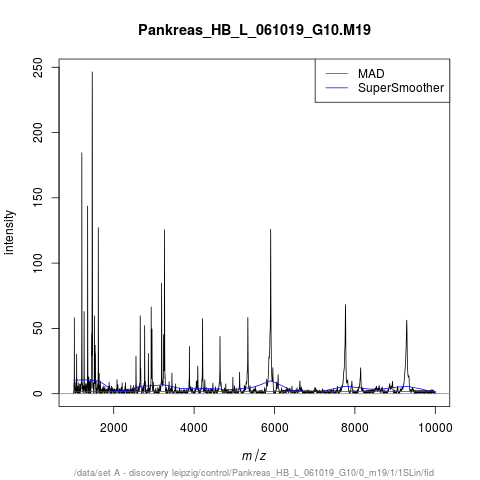Supported by Dr. Osamu Ogasawara and  providing providing  . . |
|
Last data update: 2014.03.03 |
Estimates the noise of a MassSpectrum object.DescriptionThis method estimates the noise of mass spectrometry data
(represented by a Usage
## S4 method for signature 'MassSpectrum'
estimateNoise(object,
method=c("MAD", "SuperSmoother"),
...)
Arguments
Details
ValueReturns a two column matrix (first column: mass, second column: intensity) of the estimated noise. Author(s)Sebastian Gibb mail@sebastiangibb.de See Also
Website: http://strimmerlab.org/software/maldiquant/ Examples
## load package
library("MALDIquant")
## load example data
data("fiedler2009subset", package="MALDIquant")
## choose only the first mass spectrum
s <- fiedler2009subset[[1]]
## transform intensities
s <- transformIntensity(s, method="sqrt")
## remove baseline
s <- removeBaseline(s)
## plot spectrum
plot(s)
## estimate noise
nm <- estimateNoise(s, method="MAD")
nss <- estimateNoise(s, method="SuperSmoother")
## draw noise on the plot
lines(nm, col=2)
lines(nss, col=4)
## draw legend
legend(x="topright", lwd=1, legend=c("MAD", "SuperSmoother"),
col=c(2, 4))
Results
R version 3.3.1 (2016-06-21) -- "Bug in Your Hair"
Copyright (C) 2016 The R Foundation for Statistical Computing
Platform: x86_64-pc-linux-gnu (64-bit)
R is free software and comes with ABSOLUTELY NO WARRANTY.
You are welcome to redistribute it under certain conditions.
Type 'license()' or 'licence()' for distribution details.
R is a collaborative project with many contributors.
Type 'contributors()' for more information and
'citation()' on how to cite R or R packages in publications.
Type 'demo()' for some demos, 'help()' for on-line help, or
'help.start()' for an HTML browser interface to help.
Type 'q()' to quit R.
> library(MALDIquant)
This is MALDIquant version 1.15
Quantitative Analysis of Mass Spectrometry Data
See '?MALDIquant' for more information about this package.
> png(filename="/home/ddbj/snapshot/RGM3/R_CC/result/MALDIquant/estimateNoise-methods.Rd_%03d_medium.png", width=480, height=480)
> ### Name: estimateNoise-methods
> ### Title: Estimates the noise of a MassSpectrum object.
> ### Aliases: estimateNoise estimateNoise,MassSpectrum-method
> ### Keywords: methods
>
> ### ** Examples
>
> ## load package
> library("MALDIquant")
>
> ## load example data
> data("fiedler2009subset", package="MALDIquant")
>
> ## choose only the first mass spectrum
> s <- fiedler2009subset[[1]]
>
> ## transform intensities
> s <- transformIntensity(s, method="sqrt")
>
> ## remove baseline
> s <- removeBaseline(s)
>
> ## plot spectrum
> plot(s)
>
> ## estimate noise
> nm <- estimateNoise(s, method="MAD")
> nss <- estimateNoise(s, method="SuperSmoother")
>
> ## draw noise on the plot
> lines(nm, col=2)
> lines(nss, col=4)
>
> ## draw legend
> legend(x="topright", lwd=1, legend=c("MAD", "SuperSmoother"),
+ col=c(2, 4))
>
>
>
>
>
> dev.off()
null device
1
>
|
